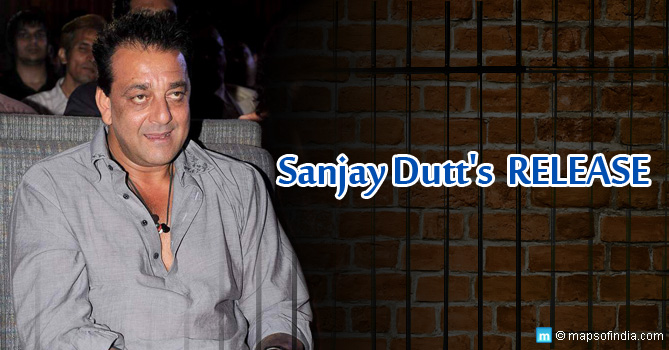Sanjay Dutt – The Star
Even as Sanjay Dutt was born in 1959, it seemed natural that he would succeed his parents as one of the brightest stars in the Bollywood firmament. His parents, Sunil Dutt and Nargis had been two of the best-loved actors of their times. And the fact that Sanjay himself was tall, ruggedly handsome and attractively muscular didn’t hurt. Even as Dutt started to sign on Bollywood movies in the 1980s, he had a whole generation of young men and women drooling over him. Some of his greatest hits of this decade included Rocky, Kanoon Apna Apna, Zahreelay, and Thanedaar.
The early 1990s brought much action into Dutt’s life – both literally and on screen. On the one hand, Sanjay Dutt’s greatest Bollywood movies were released during this time – Saajan, Sadak, Sarphira, Khalnayak, and Aatish. Dutt’s popularity was soaring; it seemed he was ready to dominate the silver screen.
In 1993, Mumbai was rocked by a series of bomb blasts. Many celebrities from Bollywood were allegedly involved. In a shocking accusation, reports suggested that Sanjay Dutt or Sanju Baba as he is popularly called, had accepted a consignment of arms and weapons from Abu Salem and Riyaz Siddiqui, leading terror lords responsible for the blasts and several other incidences of violence in the country.
Early Arrests and Bail
In April 1993, Dutt was arrested in connection with the Mumbai blasts (which had left 257 people dead and hundreds injured) and booked under the Terrorist and Disruptive Activities Act (TADA). The period between 1993 and 1997 marked Dutt’s consistency in two things – his hit movie releases and his jail visits. After having got out on bail in 1995, he was arrested again in 1995 following further investigation. Dutt walked out on bail again in 1997. After being left alone to work in peace between 1997 and 2006, things once again took a difficult turn as legal processes dragged. Dutt spent about seven months (in three spells) in various jails in Mumbai and Pune between 2006 and 2007. Public opinion oscillated and on some occasions, Dutt was branded a ‘hardened criminal’ and a misunderstood hero on others.
Sentencing Dutt
By end July 2007, the TADA court that had been deliberating Sanjay Dutt’s case sentenced the actor to six years rigorous imprisonment under Section 25-1(A) of the Arms Act which states that possession of an illegal weapon, i.e. weapon without a license shall invite a prison term of 5 to 10 years. Dutt who had been imprisoned again in October 2007 after having received a copy of his judgment, appealed against the verdict. Out on bail since November 2007, Dutt resumed work till March 2013, when the Supreme Court of India upheld the verdict of the TADA court, but reduced the sentence to 5 years – the minimum term for holding illegal weapons. The Supreme Court did acknowledge that Dutt was not involved with the serial blasts of 1993. After a series of appeals and review petitions failed to change the course of his prison term, Dutt surrendered in May 2013.
Parole and More
Despite the hype and publicity surrounding his case and sentence, Sanjay Dutt has not stayed in prison for any great length of time, with the exception of the 18 months spent after the initial arrest. Since 2013, Dutt has remained out of jail for over 146 days. The first time Dutt was granted furlough was in October 2013. Furlough is a prisoner’s right – an entitlement to be released for 14 days a year. Dutt’s furlough was extended by 14 more days. Again in January 2014, the actor was granted a month-long parole on the grounds that his wife was keeping ill health. The parole was extended by two more months. Dutt’s prolonged absence from jail led to much criticism of the system and allegations were rife that the actor received preferential treatment due to his wealth and celebrity status.
In December 2014, again, Dutt was granted 14 days furlough but this was not extended. Dutt’s furlough ended on January 7, but he did not report back to prison causing much media uproar. It, however, came to light that the prison authorities’ order rejecting his plea for extension was sent to him late by the prison authorities. This was sent on January 9 and hence Dutt was not penalized. In August 27, 2015, Dutt had again been granted a 30-day parole for his daughter’s medical treatment.
Katju’s Plea
In 2013, news reports suggested that former Supreme Court judge, Markandey Katju, had filed a petition seeking that Dutt be pardoned and the rest of his sentence remitted. Katju, the Press Council of India (PCI) head at the time, filed the pardon plea under Article 161 of the Indian Constitution and appealed to Maharashtra Governor K. Sankarnarayanan that Dutt had suffered adequately despite not being directly involved in the 1993 blasts. Katju, in his letter to the governor, cited extenuating circumstances and sought pardon. He stressed on the “various tribulations and indignities” Dutt had faced during this period. The Maharashtra government, however, vehemently opposed the pardon petition on the grounds that Dutt being a celebrity had set a bad example for the country’s youth and pardoning him would amount to condoning his crime. In September 2015, the next Maharashtra Governor Chennamaneni Vidyasagar Rao rejected this appeal following the advice of the state Home Department.
Why an Early Release?
Sanjay Dutt’s life behind bars and his parole or furlough periods have been reported by the media with much gusto. His periods at home have attracted much attention and many critics point out that these seem inordinate lengths of time to be spent at home for any accused. Dutt’s prison term once again became the subject matter of attention in January 2016 when news reports suggested that his sentence would be cut short and he would be released by February 2016 – some 400 days ahead of his scheduled release. This, however, seems to be the result of astute calculation rather than some lenience on the part of prison authorities.
- Sanjay Dutt was sentenced to 5 years in prison. This makes it a 60-month term.
- Dutt had spent 18 months of the term in prison prior to the Supreme Court’s verdict. This makes his remaining term 60-18 i.e. 42 months.
- Due to his conduct and indulgence in prison welfare activity, the actor has been given a 7-day remission for every month. This means he gets off about 420 days early. Factoring in and adjusting for all his days on furlough and away from prison, his sentence is set to end in late February 2016.
The Maharashtra Minister for State (Home), Mr Ranjit Patil is believed to have signed the orders for Dutt’s release on 27 February, 2016.





